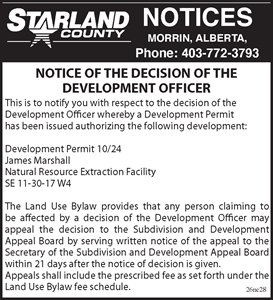
Area ranchers affected by the very dry start to the summer may have a little support as they make some tough decisions about their herd.
It has been a hot summer on the prairies, with sporadic rain at best for some producers. Ag Fieldman for Starland County Al Hampton says while there is a lot difference in conditions throughout the county, some producers had to reduce their herds.
“It is probably not as big as you would think,” said Hampton. “Feed and grass were the two biggest issues. Most of the guys were in fairly good shape.”
The federal government has lent a little support for producers who have had to reduce their herds.
“We’ve been included in the 2015 Livestock Tax Deferral Program. They have included just about everywhere on the prairies, so if a livestock owner had to downsize their herds… they will have the tax deferral program to assist them in the planning.”
This means producers who reduced their herd because of feed shortages can defer a portion of their 2015 sale proceeds of breeding livestock for one year to help offset the cost of replenishing that stock in the following year.
The program is able to kick in for affected producers without the county or MD having to declare a disaster. Starland was concerned about the conditions put upon the program, and contacted the Ministry to get clarification.
The provincial government also announced last week some programs to help affected producers.
“It’s clear that many producers are facing challenges because of the dry conditions this year, and that’s why we are finding common sense ways to help out farmers during these difficult times, said Oneil Carlier, Minister of Agriculture and Forestry.
One initiative they are undertaking is cutting the cost of rental fees for a water pumping program to help producers get water for domestic livestock.’
Starland CAO Ross Rawlusyk says this would not apply much to the county as it has its own program to distribute water. Hampton adds that most dugouts in the county are in good shape.
The Alberta Ministry of Environment and Parks is also working with municipalities to identify additional public lands that could be utilized for grazing.
Drumheller-Stettler MLA Rick Strankman says that he has driven the province and has seen a variety of conditions.
“There are many areas where the feed conditions are short, but the latest rains, which have been spotty, are allowing crops to be available for feed,” he said. “It is difficult to make a blanket statement about the desperateness of what is going on.”
He says in this constituency, he does not see much public land that could be opened up for grazing under the Provincial Government plan for relief.
“They are relying on the government supported backstops of insurance and protection programs,” he said.
“This is the kind of tone that I suspected Minister Carlier would take, and the tone I tried to bring foreword… it is measured and balanced. When you bring forward broad based policies, there can and may possibly be, unintended consequences.”

















